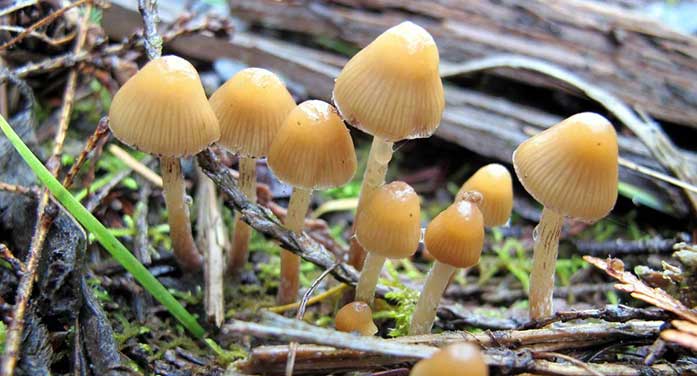 Regardless of where one stands on legalizing psychedelics for mental-health treatment, Canada is late to the party when it comes to relaxing federal regulations. And given the disturbing rise (and costs of treating) trauma, depression and other mental health disorders worldwide, we better speed up.
Regardless of where one stands on legalizing psychedelics for mental-health treatment, Canada is late to the party when it comes to relaxing federal regulations. And given the disturbing rise (and costs of treating) trauma, depression and other mental health disorders worldwide, we better speed up.
University researchers, consumers, investors and private-sector companies aren’t waiting for more favourable regulations in Canada in order to pursue psychedelics as alternative therapies.
A relatively new field, ample emerging research shows compounds such as psilocybin mushrooms, LSD and mescaline (peyote) may help people with some symptoms of depression, anxiety or trauma, particularly where traditional drug treatments have failed.
The preliminary findings are strong enough to send mushroom stocks booming on the Canadian Securities Exchange. The stocks first appeared in 2020 and are practically mainstream, with even Motley Fool making recommendations. While LSD and psilocybin are controlled substances, it’s not illegal to invest in them. Companies, however, must have a legal exemption to possess psychedelics.
Driven in part by more permissive rules in the United States, and with help from Canadian researchers, particularly at the University of British Columbia (UBC), Canadian-based companies are playing a pivotal role in driving innovation in this emerging industry. This is a welcome development.
Two recent pieces of news should make Canadians pay attention to this emerging but contentious trend.
A team of Vancouver scientists out of Core One Labs announced a breakthrough in their manufacturing process, significantly reducing the cost of making high-grade synthetic psilocybin, the active ingredient in magic mushrooms. Core One believes it will bring the price down to under $100 per gram by the end of the year, compared to US$7,000 to US$10,000 per gram in 2018, according to Johns Hopkins University.
At thousands of dollars per gram, psilocybin is prohibitively expensive for use as a treatment or in much-needed further academic research. The cost must be reduced for either application to be of significance.

Robert Hancock
“It’s a game-changer that allows for rapid, stable and cost-effective psilocybin production to bring the price down of the psychedelic compound that is showing enormous promise in treating addiction, depression and PTSD,” said Dr. Robert Hancock, an Order of Canada recipient and a globally-renowned UBC microbiologist who leads the team at Core One.
On the heels of that announcement, a new study from market research firm Research And Markets predicted the psychedelic drug market will grow to $6.3 billion by 2026 from $3.2 billion in 2021.
Sadly, this is all fuelled by a crisis in the field of psychiatry. Traditional treatments are failing, leaving a growing number of people desperate for help.
“The prevalence of mental health disorders has risen exponentially, but the development of novel medications has not kept pace, precipitating a crisis in psychiatric medicine,” said the research firm.
It may be overly optimistic to hope psychotherapy treatment can be transformed through the approved use of MDMA, psilocybin or LSD as legal components of elevated therapies. But there’s good reason to do so.
Unlike conventional antidepressants, mushrooms show long-term benefits in those who suffer from treatment-resistant depression. Psilocybin is fast-acting compared with conventional drugs, which take two to four weeks to become effective.
A secondary outcome of using psilocybin for depression seems to be lasting emotional improvements and moods. Participants in at least one small study at the Imperial College London’s Centre for Psychedelic Research found participants’ moods improved, they were better able to express emotion, and all reported a significant drop in their symptoms of depression.
But let’s not forget psilocybin is a hallucinogenic. Side-effects include hallucinations and paranoia.
“Taking magic mushrooms may cause you to see, hear or feel things that are not there, or to experience anxiety, fear, nausea and muscle twitches accompanied by increased heart rate and blood pressure,” says Health Canada’s website. “In some cases, the consumption of magic mushrooms can lead to ‘bad trips’ or ‘flashbacks.’” It may even lead to death.
Self-medicating carries risks. But without regulations, anyone can grow product and sell it online, allowing desperate consumers to experiment with doses through trial and error.
For that reason alone, Health Canada must move faster in allowing widespread legal clinical trials to proceed.
Mental health issues have affected us all these past two years, living through a global pandemic. Let’s keep an open mind on the rising use of mind-altering drugs as alternative therapies for psychiatric treatment.
Paula Arab is a Vancouver-based writer and media strategist.
Paula is a Troy Media Thought Leader. For interview requests, click here.
The opinions expressed by our columnists and contributors are theirs alone and do not inherently or expressly reflect the views of our publication.
© Troy Media
Troy Media is an editorial content provider to media outlets and its own hosted community news outlets across Canada.

